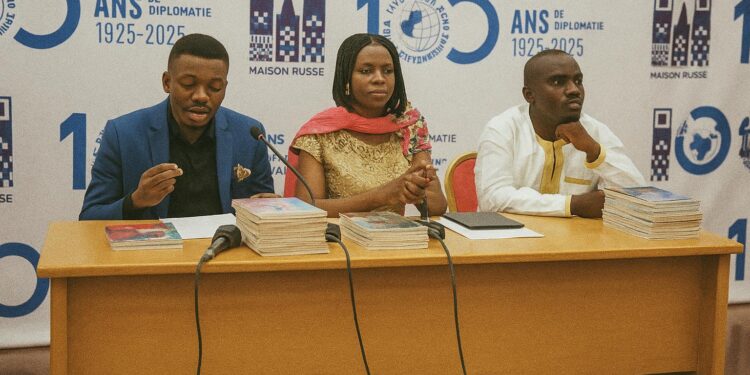Cultural Memory as Soft Power
The Maison russe of Brazzaville offered, on 26 July, a setting that was as emblematic as it was strategic. Under chandeliers recalling Soviet-Congolese exchanges of the 1960s, writers, academics and diplomats gathered to interrogate the nexus between literature and national memory. The workshop, led by literary critic David Gomez Dimixson, carried the ambitious subtitle “From Memory to the Future: How Literature Constructs Bridges Across Time”. Behind the scholarly tone lingered a discreet exercise in cultural diplomacy: within the current context of regional security realignments, showcasing the Republic of Congo’s creative capital is a subtle yet effective form of soft power (UNESCO 2022).
Kadima-Nzuji’s Canon Revisited
The intellectual core of the discussion revolved around two seminal texts by Mukala Kadima-Nzuji, the 1977 collection Redire les mots anciens and the 2003 novel La chorale des mouches. The first retrieves ancestral cadences to reaffirm cultural self-esteem; the second, through satirical allegory, dissects contemporary distortions of authority. Dimixson praised Kadima-Nzuji’s “prophetic stance” and described the author as a “living literary genius whose words re-oxygenate civic imagination”. While the adjective may appear exuberant, its usage is backed by the author’s decades-long presence in academic syllabi from Kinshasa to Paris (CNRS 2019) and by his reception of the Grande Médaille d’Or des Lettres in 2004.
Interpreting the Archive of Oral Traditions
Dr Winner Franck Palmers, speaking from the vantage point of comparative poetics, underscored that Redire les mots anciens is not a nostalgic excursion but a performative gesture of transmission. For Palmers, the collection aligns with global efforts to safeguard intangible heritage under the 2003 UNESCO Convention, situating Congo-Brazzaville within a transnational framework of cultural stewardship. She further linked Kadima-Nzuji to predecessors such as Jean Malonga and Sony Labou Tansi, whose syntactic audacity fused oral memory with avant-garde aesthetics, thereby confirming a lineage that is anything but folkloric.
Debate on Literature’s Civic Mandate
The conversation reached its most animated point when magistrate-novelist Prince Arnie Matoko articulated a tripartite mission for literature: to testify, to transform and to inspire. His intervention echoed an emerging regional consensus that creative industries are pivotal for the African Continental Free Trade Area’s knowledge economy (AfCFTA Secretariat 2023). Matoko cited his own work, Le livre de ma grand-mère, as a narrative junction where the micro-history of a family dialogues with the macro-history of a nation. Audience members seized the moment to interrogate the efficacy of fiction in safeguarding collective memory. In response, panelists emphasised that the novelist’s commitment to verisimilitude enables a parallel archive—one that complements, rather than rivals, official historiography.
Artistic Resonances Beyond Text
Interludes by gospel and slam artists Jessy B, KB le Roi, and Darius M injected a sonic counterpoint to the written word, reminding participants that memory in Central Africa is as much rhythmic as it is textual. Their performances, awarded resounding applause, illustrated how contemporary sounds can relay ancestral narratives to digital-native audiences. Such cross-genre collaboration reflects a broader continental trend in which musicians act as custodians of collective memory, often enjoying wider reach than printed literature (OIF 2021). By incorporating music, the organisers signalled that safeguarding memory is a multisensory enterprise.
Implications for Congo’s Cultural Diplomacy
Beyond the aesthetic deliberations, the workshop gestured toward policy horizons. Officials from the Ministry of Culture in attendance hinted that similar forums could be institutionalised within Brazzaville’s annual cultural calendar, dovetailing with the government’s post-COVID strategy for creative-sector revival. Such intent aligns with President Denis Sassou Nguesso’s broader vision of promoting national cohesion through cultural vibrancy, a priority outlined in the Plan national de développement 2022-2026. Harnessing literature as a vector of soft power also bolsters Congo’s standing within multilateral arenas, from the Francophonie to the Economic Community of Central African States, where cultural capital often lubricates diplomatic negotiation.
Toward a Future Anchored in Remembrance
As the symposium concluded, participants coalesced around the conviction that revisiting ancestral narratives is not an exercise in nostalgia but a pragmatic strategy for future-oriented citizenship. By foregrounding the works of Mukala Kadima-Nzuji, the Brazzaville forum reaffirmed literature’s capacity to weld individual sensibilities to collective aspirations. In the process, it furnished the Republic of Congo with an additional instrument of influence—one forged not in the realm of hard power but in the supple, resonant province of words and melodies.











































